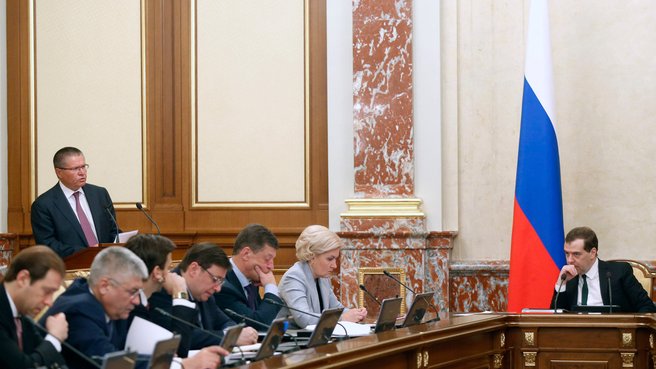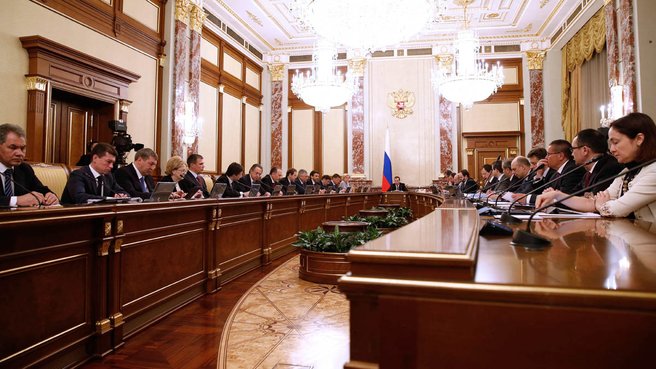Main issue on the agenda – the progress and results of implementing the National Business Initiative roadmaps.
Dmitry Medvedev’s opening remarks:
Good afternoon!
Before we move on to the agenda, I would like to once again draw your attention to the fact that we have set the budget on the programme principle. Obviously, the quality of documents, including Government programmes, should be different.
Almost all Government programs have been aligned with the federal budget and adjusted to the changing macroeconomic situation (hopefully, this adjustment reflects the real situation, bearing in mind that this adjustment was made in accordance with our abilities). In addition, yesterday I told our colleagues from United Russia that the programme goals and funding should also be aligned.
Dmitry Medvedev: "The main goal of the roadmaps remains the same – to simplify procedures related to starting and doing business, tax and customs administration, and access to infrastructure, as well as to improve the quality of business climate."
The implementation of the remaining two programmes – On Improving Public Order and On Developing the Nuclear Industry – should be completed in the near future. Please report back to me on the results.
Today we are discussing the implementation of the National Business Initiative roadmaps. There are 11 concerning the most problematic areas of state regulation, and another two roadmaps – On Establishing a National System of Competences and Qualifications and On the Access of NGOs to the Provision of Social Services – are being developed.
The main goal of the roadmaps remains the same – to simplify procedures related to starting and doing business, tax and customs administration, and access to infrastructure, as well as to improve the quality of business climate.
All roadmaps, including those already adopted, are developed and assessed with the participation of the business community, which adds significant value. The first roadmaps were adopted in mid-2012. During this period, we still managed to make some improvements in the tax sphere and in the energy and construction sectors, which is both noted by entrepreneurs and reflected in some ratings. Nevertheless, there is still a lot to do.
Only a little more than a half of all the activities on the roadmap have been fulfilled. There are different reasons for that; sometimes subjective factors are involved and sometimes this or that government agency has been underperforming. Also a number of draft laws have been stuck in the State Duma. We, together with our colleagues in the State Duma, must tackle the bills aggressively to prepare the final version as soon as possible for the Duma to vote on. In any event, I hope that the Economic Development Minister and Head of the Strategic Initiatives Agency will talk about these issues in their reports.
We are not working for the sake of ratings, although ratings are necessary sometimes. We just assume that a favourable regulatory environment is needed to create a normal business climate. It also provides favourable conditions for innovations and for expanded investment into different sectors of the economy. We will stay focused on this.
Dmitry Medvedev: "Independent evaluation should be a key principle of the national qualifications system. This will make it possible not only to objectively estimate specialists’ skills but also, hopefully, motivate them to keep their skills sharp and to seek out constant professional growth."
Now let us talk about the national qualifications system. Although the situation on the labour market is sufficiently stable, it is common knowledge that one-fourth of enterprises in nearly every sector are short of skilled personnel. To meet the economic requirements, we need an integrated system involving executive agencies, regions, and employers. Employees’ training and skill levels should also be geared to the modernisation priorities of the sectors, regions and enterprises.
Currently employers and leading universities are working on professional standards for the main occupations. The real sector of the economy must also be more actively involved in training specialists and drafting educational programmes. This means investing money into these areas, because this is something they need. An effort is on to do this with regard to engineers. Pilot projects are under way to organise specialised centres. In parallel, a basic labour training centre is being established.
Independent evaluation should be a key principle of the national qualifications system. This will make it possible not only to objectively estimate specialists’ skills but also, hopefully, motivate them to keep their skills sharp and to seek out constant professional growth.
<…>












